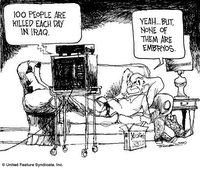 The U.S. government, which wants no part of a cease-fire until Israel is given every opportunity to rescue its kidnapped soldiers and destroy as many Hezbollah and Hezbollah armaments as possible, urges caution in the interest of preserving a nascent and fragile democratic government in Lebanon. Could we be more conflicted?
The U.S. government, which wants no part of a cease-fire until Israel is given every opportunity to rescue its kidnapped soldiers and destroy as many Hezbollah and Hezbollah armaments as possible, urges caution in the interest of preserving a nascent and fragile democratic government in Lebanon. Could we be more conflicted?While the United States provides about $2.5 billion in military and economic aid to Israel each year, U.S. aid to Lebanon amounts to no more than $40 million. This despite the fact that the per capita GDP of Israel is among the highest in the world at $24,600, nearly four times as high as Lebanon's GDP per capita of $6,200.
Lebanon's lack of wealth is matched by the Palestinians -- three out of every four Palestinians live below the poverty line. Yet the vast majority of our giving in the region flows to Israel. This kind of geopolitical inconsistency and shortsightedness has contributed to the Arab-Israeli conflict that the Western world seems content to allow to perpetuate endlessly.
As our airwaves fill with images and sounds of exploding Hezbollah rockets and Israeli bombs, this conflict has completely displaced from our view another … of more than three years duration that has claimed almost 15,000 lives so far this year alone.
 An estimated 50,000 Iraqis and more than 2,550 American troops have been killed since the insurgency began in March of 2003, which by some estimates is more than the number of dead on both sides of the Arab-Israeli conflict over the past 58 years of wars and intifadas.
An estimated 50,000 Iraqis and more than 2,550 American troops have been killed since the insurgency began in March of 2003, which by some estimates is more than the number of dead on both sides of the Arab-Israeli conflict over the past 58 years of wars and intifadas.In the Middle East, where is our sense of proportion? Where is our sense of perspective? Where is our sense of decency? And, finally, just how smart are we?
[Excerpt from Lou Dobbs, CNN]

